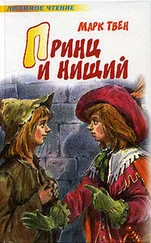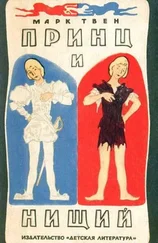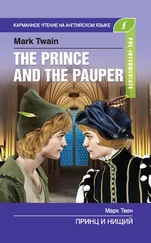Next (затем), the tired captive sat down (усталый пленник сел; to sit — сидеть; to sit down = садиться: «сесть вниз») and was going to take off his buskins (и собирался снять свои башмаки), timidly asking leave with his eye (робко прося разрешения взглядом: «глазом»), but another silk-and-velvet discomforter (но другой шелково-бархатный нарушитель спокойствия) went down upon his knees (опустился на колени) and took the office (и взял на себя это дело: «обязанность») from him (от него). He made two or three further efforts (он сделал еще два или три дальнейших усилия) to help himself (помочь себе = справиться самостоятельно), but being promptly forestalled each time (но будучи быстро опережен каждый раз), he finally gave up (он наконец сдался; to give up — сдаваться), with a sigh of resignation (со вздохом покорности) and a murmured (и сказанными под нос словами; to murmur — бормотать) 'Beshrew me (будь я проклят; to beshrew — проклинать), but I marvel they (но я удивляюсь (что) они) do not require to breathe for me also (не требуют дышать за меня также)!' Slippered (в шлепанцах; slippers — шлепанцы), and wrapped in a sumptuous robe (и закутанный в роскошное платье), he laid himself down at last to rest (он улегся наконец, чтобы отдохнуть; to lay down — класть, ложиться), but not to sleep (но не чтобы спать), for his head was too full of thoughts (так как его голова была слишком полна мыслями) and the room too full of people (а комната слишком полна людей). He could not dismiss the former (он не мог отогнать первые [т.е. мысли]), so they stayed (так что они остались); he did not know enough to dismiss the latter (он не умел достаточно, чтобы распустить последних [т.е. людей]), so they stayed also (так что они остались тоже), to his vast regret (к его большому сожалению) — and theirs (и их /сожалению/).
rescue [`reskju:], inwardly [`ınwədlı], gracious [`greıSəs]
There was a pause now, a sort of waiting silence which Tom could not understand. He glanced at Lord Hertford, who gave him a sign — but he failed to understand that also. The ready Elizabeth came to the rescue with her usual easy grace. She made reverence and said:
'Have we leave of the prince's grace my brother to go?'
Tom said:
'Indeed, your ladyships can have whatsoever of me they will, for the asking; yet would I rather give them any other thing that in my poor power lieth, than leave to take the light and blessing of their presence hence. Give ye good den, and God be with ye!' Then he smiled inwardly at the thought, ''tis not for naught I have dwelt but among princes in my reading, and taught my tongue some slight trick of their broidered and gracious speech withal!'
When the illustrious maidens were gone, Tom turned wearily to his keepers and said:
'May it please your lordships to grant me leave to go into some corner and rest me!'
Lord Hertford said:
'So please your highness, it is for you to command, it is for us to obey. That thou shouldst rest, is indeed a needful thing, since thou must journey to the city presently.'
He touched a bell and a page appeared, who was ordered to desire the presence of Sir William Herbert. This gentleman came straightway, and conducted Tom to an inner apartment. Tom's first movement there was to reach for a cup of water; but a silk-and-velvet servitor seized it, dropped upon one knee, and offered it to him on a golden salver.
Next, the tired captive sat down and was going to take off his buskins, timidly asking leave with his eye, but another silk-and-velvet discomforter went down upon his knees and took the office from him. He made two or three further efforts to help himself, but being promptly forestalled each time, he finally gave up, with a sigh of resignation and a murmured 'Beshrew me, but I marvel they do not require to breathe for me also!' Slippered, and wrapped in a sumptuous robe, he laid himself down at last to rest, but not to sleep, for his head was too full of thoughts and the room too full of people. He could not dismiss the former, so they stayed; he did not know enough to dismiss the latter, so they stayed also, to his vast regret — and theirs.
Tom's departure (уход Тома) had left his two noble guardians alone (оставил его двух благородных стражей одних). They mused awhile (они находились в задумчивости некоторое время), with much headshaking (с покачиваниями головой; to shake — трясти) and walking the floor (и ходьбой туда-сюда; floor — пол), then Lord St. John said (затем лорд Сент-Джон сказал):
'Plainly (итак, по совести; plain — плоский, ровный; очевидный, явный, ясный), what dost thou think (что ты думаешь)?'
'Plainly, then, this (откровенно, значит, вот что). The king is near his end (король близок к концу), my nephew is mad (мой племянник безумен), mad will mount the throne (безумным взойдет на трон; to mount — вскарабкаться, забраться), and mad remain (и безумным останется). God protect England (защити Бог Англию), since she will need it (ибо она будет нуждаться в этом; to need — нуждаться)!'
'Verily it promiseth so (истинно это обещает (быть) так; to promise — обещать), indeed (действительно). But (но)... have you no misgivings (не имеешь ли ты дурных предчувствий) as to... as to... (касательно… касательно…)'
The speaker hesitated (говорящий запнулся), and finally stopped (и наконец остановился = замолк). He evidently felt (он, очевидно, почувствовал; to feel — чувствовать) that he was upon delicate ground (что он ступил на деликатную территорию). Lord Hertford stopped before him (лорд Хартфорд остановился перед ним), looked into his face with a clear, frank eye (посмотрел ему в лицо ясным, прямым взглядом: «глазом»), and said (и сказал):
'Speak on (говори дальше = продолжай) — there is none to hear but me (некому услышать, кроме меня). Misgivings as to what (предчувствий касательно чего)?'
'I am loath (мне не хочется: «я есть нежелающий») to word the thing that is in my mind (высказать вещь, которая у меня на уме), and thou so near to him in blood (а ты так близок ему по крови), my lord (милорд). But craving pardon (но будучи жаждущим прощения) if I do offend (если я все-таки нанесу оскорбление; to offend — обидеть, оскорбить), seemeth it not strange (не кажется ли странным) that madness could so change his port and manner (что безумие могло бы так изменить его повадку и манеру держаться)! — not but that his port and speech are princely still (не то что бы его манера и речь не были все еще достойны принца), but that they differ in one unweighty trifle or another (но что они отличаются в том или ином незначительном пустяке), from what his custom was aforetime (от /того/, каким его обыкновение было раньше). Seemeth it not strange (не кажется ли это странным) that madness should filch from his memory (чтобы его безумие похитило = стерло из его памяти) his father's very lineaments (самые черты (лица) его отца); the customs and observances (обычаи и знаки внимания) that are his due (которые ему подобают) from such as be about him (от тех кто суть вокруг него = окружают его); and, leaving him his Latin (и, оставив ему его латынь), strip him of his Greek and French (лишило его его греческого и французского)? My lord (милорд), be not offended (не обижайся = не будь оскорблен), but ease my mind of its disquiet (но облегчи мой разум от его беспокойства) and receive my grateful thanks (и прими мои благодарности; grateful — благодарный; thanks — благодарность). It haunteth me (это преследует меня = мысль), his saying he was not the prince (его слова, что он не принц), and so (и так) —'
Читать дальше
Конец ознакомительного отрывка
Купить книгу




![Марк Твен - Принц и нищий [Издание 1941 г.]](/books/148799/mark-tven-princ-i-nichij-izdanie-1941-g-thumb.webp)







